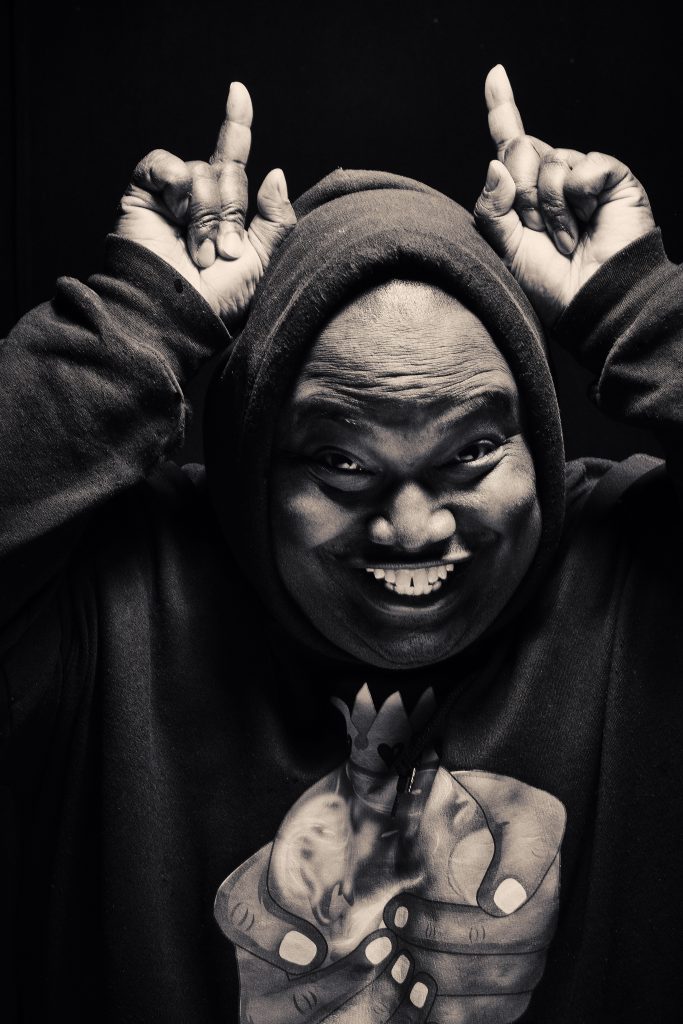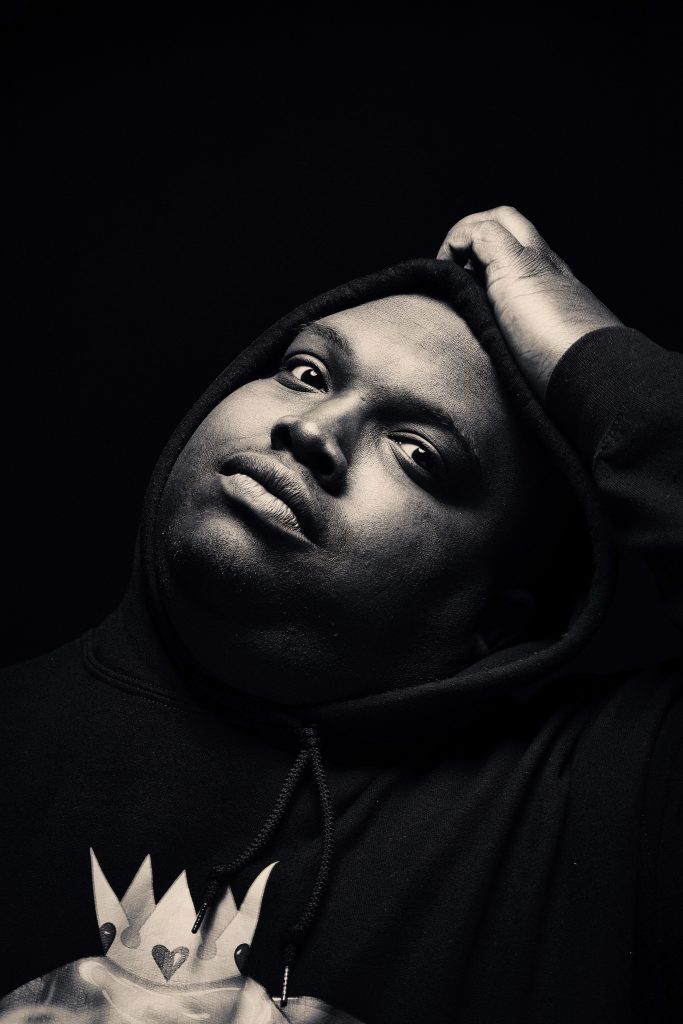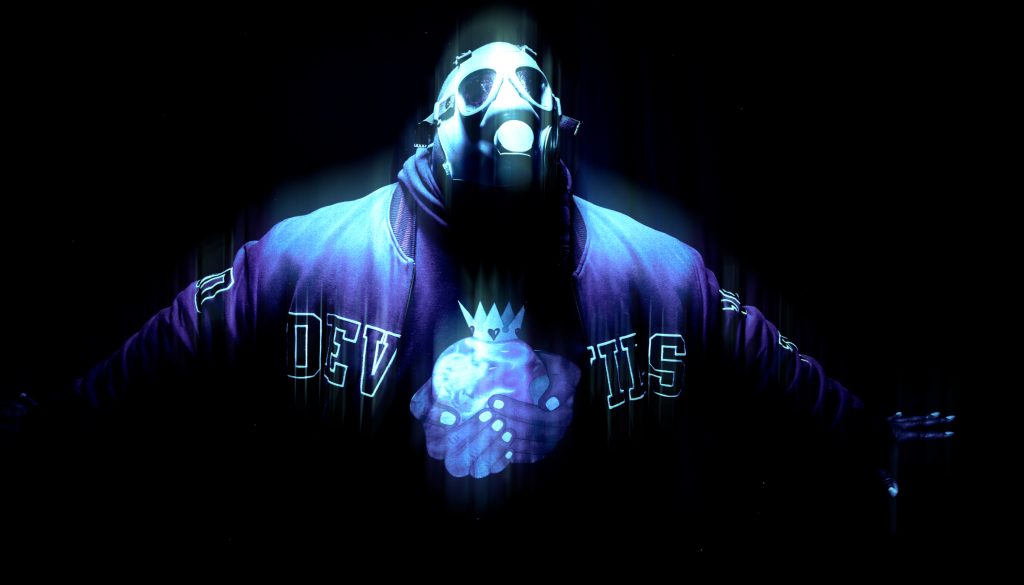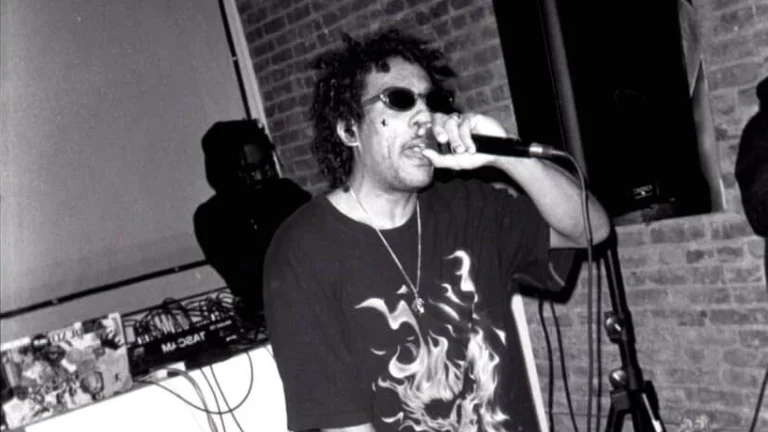“I produce un-detachable poison” half-raps, half-grumbles Fatboi Sharif on “Phantasm,” the spooked-out highlight of his 2023 album, Decay, produced entirely by Steel Tipped Dove. Amid niche John Carpenter references, dread-conjuring guitar riffs, and eerie tremors of bass that hit like the footsteps of someone tiptoeing their way through an abandoned mental asylum, this Rahway, New Jersey-based underground rap wordsmith also spits his mission statement as an artist: “Supreme Knowledge, put a spell on them.”
For Sharif, this supreme knowledge tends to revolve around cataclysmic prophecies (on “East Hollywood” he debates whether climate change will result in another bubonic plague) and alliteration-heavy, post-apocalyptic poetry that boldly tows the line between enlightened and psycho-babble. He once rapped (inhales bong): “The nazi showed his needle marks / Neverminded in Niagara Falls.”
Since emerging in the late 2010s, Sharif has consistently put his fans in a trance via dimly-lit, horror-indebted storytelling and heavy, psychedelic boom bap sonics, which hit your ear like El-P’s Fantastic Damage and Black Sabbath’s Paranoid just had a baby. Sharif raps from the very pit of his portly tummy, resulting in a bewitching baritone that doesn’t so much ride instrumentals as haunt them. It’s an experience akin to a poltergeist issuing cryptic threats through a possessed child. And, this is a unique technique furthered by Sharif’s typically strange new EP, Psychedelics Wrote The Bible, produced by Duncecap.
The melting, shroomed-out strings of the EP’s lead single “Fetus” breathe fresh life into the rotting corpse of horrorcore rap. Intense yet carefree, this brilliant new song is a panic attack you can somehow nod your head along to. On this new project, he continues to playfully move morose couplets around like Jenga pieces (“Crop circle church towers, Vietnam color book”), vomiting out verbs in a way that sounds like the classic zombie video game Left 4 Dead’s Boomer villain if it were actually an emcee.
It’s fair to say that, 2021’s “Fly Pelican” aside, Sharif’s discography is about as mainstream-friendly as a Charles Manson Christmas single. However, at a moment where so much hip hop feels one-note, Sharif’s commitment to taking risks—his 10-minute, Roper Williams-produced magnum-opus, “Something About Shirley”, is practically the rap version of The Beatles’ infamous avant-garde experiment “Revolution 9”—and breaking genre conventions feels especially important. Given the surreal artistic leanings, it’s also no surprise that risk-taking rap lyricists like billy woods, who released Decay on his cult Backwoodz label, and Kool Keith are among Sharif’s high-profile fans.
The commitment to such a singular sound suggests an artist who is playing the long game, and will fight to innovate rather than chase time-limited trends. Whatever the future holds for Fatboi Sharif (and he reveals plans to release an Alice In Chains-esque rock album), just don’t focus on the “horrorcore” tag for too long. “I get why people say that word about my music, but I don’t like genre tags,” he concludes. “I always want to create new things, which are so fresh that it’s difficult to put any kind of label on them, period.”
To celebrate the release of Psychedelics Wrote The Bible, EveryDejaVu spoke to Fatboi Sharif on an early morning phone call, covering manipulated rap vocals, government cover-ups, haunted cinemas, and why the underground is leading the way in hip-hop culture right now.


I’ve always found it fascinating how you reference religion in your music. I think of the track “Nasty Men,” where you said your sanity was “manipulated like Christianity,” or “1999 Hacker” and its bleak visions of priests crying out blood tears. Where do these ideas come from?
I grew up with a lot of religion around me. Some of my family were based in South Carolina, and I had an uncle who owned this church out there. We’d travel down there during the holidays and watch him preach, which, I guess, taught me a lot about speech and moving a crowd. My mother was a Christian from a young age, and my dad converted to Islam. I studied their different approaches to life, from the negatives to the positives.
Is it true you used to work in a cinema? For a horror movie fan, that must have been a dream, and would you agree it’s a big part of why your songs are so grimly cinematic?
I always liked horror movies where the audience is unsure whether it’s real or not. The original 1980 Cannibal Holocaust was so realistic that the film’s director [Ruggero Deodato] was taken to court on charges of murder. But that was the greatest artistic compliment he could ever have received, right!? The cinema was cool, but I am pretty sure it was haunted too. Someone apparently passed away in an accident there, back when it was first being constructed. There was this weird ass energy on the theater floor, but it was kind of exciting: I always wanted my music to feel like that.
I love your new single “Fetus” and the bar about how “despite government cover-ups, they couldn’t get rid of us.”
Being black in America, well, you find out as history goes on, just how often your own government has tried to hold you back. That lyric is me talking about how this cycle keeps on persisting. Honestly, “Fetus” might be one of my favorite songs I ever recorded. When I listen back to it, it brings tears to my eyes! I wanted my writing to be so good on that song that if you heard me standing on the street corner just reciting its lyrics, you’d have no choice but to stop and listen.
Going back even further to “Realms of Human Understanding” and the lyrics, “My past is a dystopian future.” Are you just a really big Philip K. Dick fan, or was there something in your past that makes you more attuned to apocalyptic darkness?
Coming up, I went through a lot of crazy things and different tragedies. But things going wrong put me on the path of always embracing what comes next and never getting too comfortable or sitting in the same spot for too long, you know what I mean? My music might be dark, sure, but it’s all about creating a new experience. You might hate it, you might love it, but after three or four visits, you’re going to feel like the world I’ve created is living and breathing. It’s something you can get lost listening to. I love creating musical worlds for people to just grow and grow into.
Going back to your original question, I want my music to make people feel less scared about dark shit, definitely. You can’t let it defeat you! There’s always a creative way to work through something bad, and I represent that.
Your voice is really unique. It’s dense and chest-deep, and you experiment with vocals in a way where it can sound demonic while other times smoother than butter. Manipulating vocals is a big part of the Fatboi Sharif experience, right?
The voice is always one of the most important parts of a track. I might record six vocal tracks, just for one song. There might be three or four different ad-lib layers. One vocal track I will pitch down, the other will be pitched up, but it all creates this feeling of split personalities [interacting with one another]. On a song like “Cloud Atlas” I’m using my voice to give you broken English. The vocals are free-spirited.
You also rap a lot about shadow figures and how dreams intersect with the real world. Can sleep really help you write a song?
100%. A lot of my most ill lines come to me at night. Artists don’t have regular sleep schedules, because we’re always out at random places and late-night sessions. So, I might get in at 2 AM, wake up at 4:30 AM due to a nightmare, and I will then write my dream down on paper. When I wake up at 7 AM, I’m ready to record my dream into a full song.
Does it feel like America’s underground rap scene is putting out better music than the mainstream right now? Because I definitely feel like the underground is stepping up and providing that substance, while the major labels seem to be putting out albums that feel more like empty, brand-sponsored playlists.
The quality is so much better in the underground, yeah. I believe the world is waking up to this, more and more each day.
And, if it all stopped tomorrow, what would you like them to remember you for? You’re certainly the only emcee I’ve ever heard talk about werewolf sex workers in a song.
[Laughs] It’s simple: I want them to say I was someone who always did what he wanted to do and created new experiences for the listener. The key was always that my writing felt conversational. I don’t like overwriting shit or it doesn’t feel true to how people speak in real life! Whatever happens, I think they’ll remember me as a rapper who inspired the next generation of writers to push it further and further out there with their ideas.





